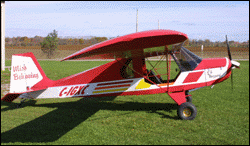Challenger, Challenger ultralight, Quad City Challenger airframe troubleshooting.
|
|
|
|
|
|
|
|
|
|
|
|
Click here for this months specials! |
|
|
 |
|
|
Quad City Challenger airframe troubleshooting.
|
|
The Challenger airframe uses aluminum tube, rivet together construction. While this
type of construction makes for quick and easy building, it has also shown itself to be a
system that will show its age early if abused or neglected. The type of suspension used on
the Challenger provides very little absorption. Thus many of the bumps and grinds
associated with routine flying are absorbed by the airframe (leading to loose rivets).
Inspection areas include:
- The fuel tank support brackets.
- Owners report the rivets around the box supporting the gas tank to work loose.
- The horizontal stabilizer.
- Wear has been reported at the end of the horizontal stabilizer tube where it connects to
the vertical fin channel bracket. This wear is caused by vibration. To help prevent wear,
install plastic washers on either side of the horizontal stab tube where it fits into the
channel brackets.
- The horizontal stabilizer jury struts.
- Wear has been reported in the holes at either end of the jury struts located on the
horizontal stabilizer, and on the wing struts. If strut holes are elongated replace tube
immediately. I replace the aluminum tube with a chrome moly tube.

- The jury strut brackets.
- Wear or failure of the jury strut brackets that connect the horizontal stabilizer,
vertical fin, and wing jury struts has been reported. The original brackets were made from
very thin aluminum. It is recommended that ALL of these aluminum brackets be replaced with
the newer stainless steel brackets.
- The nose wheel support cross tube and attachment clamps.
- Failure of the worm drive clamps, and failure of the cro
 ss tube has been reported. A
successful solution has been to manufacture a new upper bracket then drill and install two
AN bolts. ss tube has been reported. A
successful solution has been to manufacture a new upper bracket then drill and install two
AN bolts.
- The tail support wheel bracket.
- Failure of the tail wheel and support bracket have been reported. When these fail it
allows the rudder to contact the ground.
- The wing tip tubing.
- Several owners have reported failure of the wing tip tube. Failure is occurring at the
rivets used to attach the tube to the leading and trailing edge.
- The bottom of the rudder.
- Owners have reported abnormal wear on the bottom of their rudders. In some cases it is
due to the failure of the tail wheel support bracket. In other cases it is do to long
grass or soft terrain allowing the tail wheel to sink into the ground. Wind then moves the
rudder back and forth. It is suggested the rudder stops be used to help prevent this kind
of damage. Another suggestion is to place a patio slab or piece of plywood under the tail
wheel where the aircraft is parked.

- Main landing gear:
- The Challenger main landing gear consists of two aluminum tubes which plug into two
steel sockets which are attached to the main airframe. Owners have reported failure of the
welds around the main socket.
- Nose gear:
- The nose wheel assembly on the Challenger has been reported to fail directly below the
lower bearing of the steering tube. Owners have also reported failure of two support rods
that are welded to this steering tube, failure happens at the area of the welds.
|
|
|
 |
|
|
|
|
|
Ultralight
News
By Appt. ONLY!
Airfield
|
|
|
|
Ultralight Aircraft News Web Magazine .
You may link to these pages or print
them out for your own personal use, but no part of this
publication may be copied or distributed, transmitted, transcribed,
stored in a retrieval system, or translated into any human or computer
language, in any form or by any means, electronic, mechanical,
manual, or otherwise, without the written permission of Ultralight News.
By copying or paraphrasing the intellectual
property on this site, you're automatically signing a binding contract
and agreeing to be billed $10,000 payable immediately. Copyright Ultralight News
|
|
Return
to Main Index for this section |
|
|



 ss tube has been reported. A
successful solution has been to manufacture a new upper bracket then drill and install two
AN bolts.
ss tube has been reported. A
successful solution has been to manufacture a new upper bracket then drill and install two
AN bolts.
